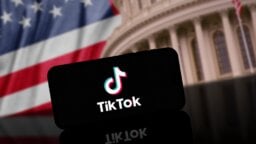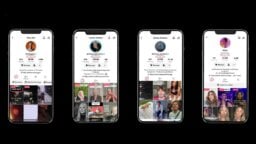TikTok’s ‘Add to Music App’ – a feature that allows TikTok users to save songs they hear on the platform to their music streaming accounts – rolled out in the US and UK last November, and was expanded to another 19 countries – including France, Germany and Japan – the following month.
In February, the feature saw a mass roll-out in another 163 countries, making it available virtually everywhere that TikTok itself is available. Except for a certain group of countries: Those where TikTok is in direct competition with music DSPs, via its TikTok Music streaming service.
The premium-only TikTok Music service launched last July in Indonesia and Brazil, following a number of hints that the short-video platform planned to make a move into music streaming.
In October, TikTok Music expanded to Australia, Mexico and Singapore. And – for reasons we can only speculate on – those countries were left out of the rollout of the Add to Music App.
However, that is now changing. TikTok has confirmed that the Add to Music App feature is rolling out in Brazil and Indonesia. While it’s still not available in the other three TikTok Music countries, the company says it expects the feature to become available there “in the future.”
And, not surprisingly, TikTok Music itself will be one of the services users will be able to save music to, along with Spotify, Apple Music and Amazon Music.
The Add to Music App in these countries appears to be quite impartial. One might expect that TikTok Music would be given a place of prominence when users choose which music service to save to, but in fact, TikTok Music is listed at the bottom. The list appears to be in alphabetical order (see header image).
The Add to Music feature works within TikTok via a button that says “Add Song” at the bottom of videos in a user’s “For You” feed, and from an artists’ Sound Detail page.
When users click this button, they save the song to a playlist in the music streaming service, that is, Apple Music, Amazon Music or Spotify (and now, in Brazil and Indonesia, TikTok Music).
Songs are saved to a default playlist in these music apps, but users also have the option of saving them to a new or existing playlist they’ve created. Users can also change the music app to which the songs are saved.
The continued rollout of the Add to Music App (and of TikTok Music) is a clear sign that TikTok means to expand its role in the music business – even as it finds itself in conflict with the world’s largest music rights holder, Universal Music Group, and is facing a possible ban or forced divestment from its parent company under US law.
Universal Music Group (UMG)’s recorded music catalog (about 3 million tracks) disappeared from TikTok at the end of January, as the two companies failed to come to an agreement on licensing fees for music used in TikTok videos.
Universal Music Publishing Group‘s catalog (about 4 million songs) began to disappear from TikTok about a month later, and – given recent comments by UMG Chairman and CEO Sir Lucian Grainge – it looks like the two companies are still pretty far from coming to an agreement.
Amid the ongoing conflict, some indie record companies have sided with UMG, while the National Music Publishers Association (NMPA), which represents the rights of a number of indie music publishers, has said it won’t renew its licensing deal with TikTok when it expires at the end of April. It will be up to individual publishers to negotiate terms with TikTok, if they wish to do so.
Most recently, Because Music founder and CEO Emmanuel de Buretel penned a scathing op-ed in France’s Le Monde, criticizing TikTok for what he says are the company’s disregard of industry norms, use of modified music, and addictive algorithms.
“As players in the music market… we cannot accept that the consumption and disfigurement of works should be built around an algorithm that thrives on the backs of thousands of employees, craftsmen and artists around the world, and… by actively participating in the creation of a platform that feeds on artistic creation by destroying it,” de Buretel wrote.
Meanwhile, TikTok is also facing conflict in Washington, in the form of a new bipartisan bill in the House of Representatives that, if passed into law, would give TikTok parent company ByteDance 165 days, or just over five months, to divest its holdings in TikTok, or face a ban on the app in the US.
The bill stems from growing concerns that ByteDance is sharing US users’ data with the Chinese government, potentially posing a national security risk.
Though similar attempts at reining in TikTok have been made in the US before, this bill seems to have unprecedented momentum, sailing out of the House Energy and Commerce Committee in a unanimous (50-0) vote last week, and already heading to the House floor for a vote this week. President Joe Biden has signaled his support for the bill.
TikTok has responded with a full-on pressure campaign against the bill, arguing it infringes on the freedom of speech rights of 170 million TikTok users in the US, and threatening millions of businesses that rely on the platform for marketing. The company has added a pop-up window for some TikTok users in the US that urges them to contact their local House representative to ask them to oppose the bill.
Congressional insiders say TikTok’s campaign has resulted in a flood of calls to House representatives, though some insiders say the move has “backfired” because of the aggravation caused by TikTok’s campaign.
Besides TikTok’s own opposition, the bill has received pushback from civil liberties groups such as the American Civil Liberties Union (ACLU) and the Electronic Frontier Foundation. It’s also opposed by the Computer & Communications Industry Association (CCIA), whose members include Amazon, Apple, Google and Meta Platforms, among others.Music Business Worldwide







